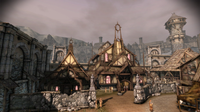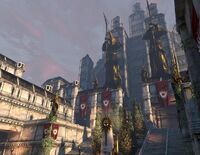The Chantry is the dominant religious organization in Thedas. It is based on the Chant of Light, a series of teachings written by Andraste, the prophet of the Maker, and was founded by Kordilius Drakon, the first emperor of Orlais. Its followers are known as Andrastians. "Chantric" is also an acceptable adjective to refer to something or someone that is of the Chantry religion.
The Chantry's goal is to spread the Chant of Light to all four corners of the world, that includes non-humans as well. The view of the Chantry on non-humans is that they need saving—they have turned even further from the Maker's grace than humanity has. Elves were, and in some cases still are, pagan and dwarves venerate The Stone. Once all peoples have accepted the Chant and practice its teachings, supposedly the Maker will return to the world and return it to its previous glorious state.
The Chantry calendar is used everywhere in Thedas, save for the Imperium, and is the source of the names of the Ages.
History
When Andraste died a martyr, around her legend grew a cult known as “the Chantry,” and with it came the Chant of Light.[1] The clerics of this cult were oppressed[2] until the Chantry was formalized by Kordillus Drakon, the first Emperor of the Orlesian Empire, who established the Andrastian faith as the national religion. Three years later the first Divine, Justinia I, was declared. Drakon's military successes during the Second Blight significantly expanded the borders of Orlais, and soon after the conquered lands converted to the faith. While these lands would later liberate themselves from Orlesian rule following Drakon's death, the religious practice still remained.
During the Towers Age there was debate in the Chantry over whether Andraste was truly divine. It was largely the Imperial Chantry's belief that she was not divine that led to the schism in the Chantry and the eventual founding of the Imperial Chantry as a separate religion.
With so much influence over the people, the Chantry can also exert considerable political pressure on the ruling classes in many areas of concern. In extraordinary times, and in deference to Andraste, the Divine may also be moved to declare an Exalted March. These religious crusades have mobilized armies of thousands to destroy the heretical enemies of the Maker. The first March after Andraste's death being against the elves of the Dales, next 4 were against Tevinter and the most recent led against the Qunari, that time also Tevinter took part in that march.[3].
With start of Mage-Templar War in 9:40 Dragon the Chantry lost control over the Circles of Magi, Templar Order and the Seekers of the Truth.
Chantry hierarchy
The actual priesthood of the Chantry is made up entirely of women, on the basis that Andraste was a woman. Men can be brothers, serving as academics and initiates, but it is a junior position and non-ordained. Those who have received religious and martial instruction while being raised in the Chantry may become templars. At the head of the Chantry is the Divine, who leads from her seat in the Grand Cathedral of Val Royeaux. Below her are the grand clerics, some of whom administer the chantries of major cities.
Practices
The funeral rites of the Chantry involve cremation. As Andraste's body was burned, and her spirit ascended to stand by the Throne of the Maker, so too will that of her followers. It may also be to ward off the possibility of the corpse becoming the subject of demonic possession.
Chantries in Thedas

The Denerim cathedral
Members of the Chantry often worship in buildings called chantries. These chantries are present in almost every village, town and city and some will also maintain a Chanter's Board. At most chantries a religious character can receive a blessing or agree with the faithful. A non-religious character can disagree with the faithful, refuse a blessing or refuse to donate coin.
Chantries deliver practical services to the community, caring for the sick and collecting alms for the poor. The Chantry provides hospitality to travelers and a public network of communications. Should an illiterate commoner need to send word to another town, the Chantry's educated priests write and send the letter for him.

The Kirkwall chantry
- Lothering chantry, Lothering (destroyed by the darkspawn in Dragon 9:30)
- Denerim Cathedral, Denerim Market District
- Chantry of our Lady Redeemer, City of Amaranthine (this chantry can be destroyed, depending on player choices)
- Village Chantry, Redcliffe Village (this chantry can become abandoned, depending on player choices)
- Haven Chantry, Village of Haven (this chantry is not formally part of the Andastrian Chantry primarily due to the fact that its existence is not known)
- Orzammar chantry, Orzammar Commons (this chantry can be prevented from ever forming, depending on player choices)
- Alternatively, a Circle of Magi outside of the Chantry's control can be established depending on player choices.
- Abandoned Chantry, Forlorn Cove (this abandoned site can be the scene of bloodshed, depending on player choices)
- Kirkwall Chantry, Kirkwall (destroyed by Anders in Dragon 9:37)
- Grand Cathedral, Val Royeaux
Chapels in Thedas
A countryside chapel in Orlais.[4]
Chapels are located in larger self-contained buildings for the convenience of its inhabits. These mostly include castles, forts and the Circle of Magi. At all chapels a religious character may receive a blessing or participate in a prayer to the Maker. A non-religious character can disagree with the faithful or refuse a blessing.
- Fort Drakon, Denerim (blessing is only available if using the disguise method of escape during Captured!)
- Castle Cousland, Highever (blessing and prayer is only available to the Human Noble Origin)
- Redcliffe Castle, Lake Calenhad (blessing only available after the castle's problems have been solved.)
- Circle Tower, Lake Calenhad (prayer only available to the Mage Origin)
- Ostagar, Southern Ferelden (blessing is only available during the first visit)
Related codex entries
A Chantry altar.
![]() Codex entry: The Founding of the Chantry
Codex entry: The Founding of the Chantry
Codex entry: The History of the Chantry, Chapter 1
Codex entry: The History of the Chantry, Chapter 2
Codex entry: The History of the Chantry, Chapter 3
Codex entry: The History of the Chantry, Chapter 4
![]() Codex entry: The Imperial Chantry
Codex entry: The Imperial Chantry
![]() Codex entry: Chantry Hierarchy
Codex entry: Chantry Hierarchy
![]() Codex entry: Andraste: Bride of the Maker
Codex entry: Andraste: Bride of the Maker
References
- ↑ Prima Official Game Guide: DAO Collector's Edition.
- ↑ Prima Official Game Guide: Dragon Age II (Extras -> DA Encyclopedia -> Races and Religion -> Humans).
- ↑ Prima Official Game Guide (Collector's Edition), p256
- ↑ Dragon Age: The World of Thedas Vol.1, page 57.
| ||||||||||||||||||||||||



